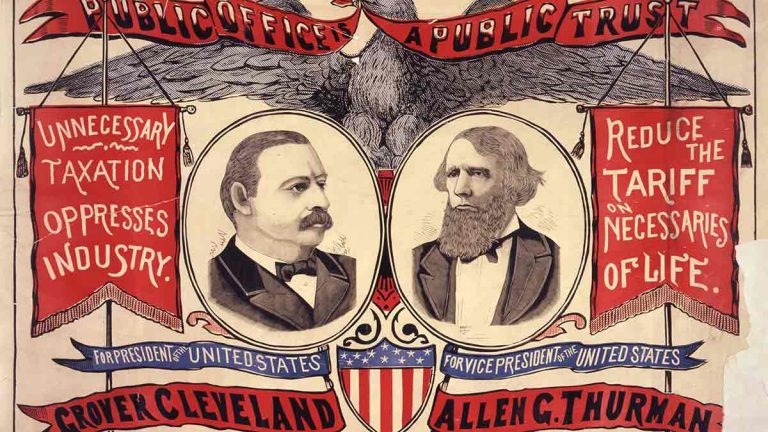If you’re like me (I know you’re not, but humor me), you’ve got some very definite views on which of the 44 men who have served as President of the United States did the best job. Wait, 44 men? Isn’t Donald Trump the 45th president? He is, and that discrepancy is highly relevant to what follows, because my favorite president is Grover Cleveland, the man responsible for the numbering confusion.
Grover Cleveland was both the 22nd and 24th president of the U.S., having been defeated after his first term by the upstart Benjamin Harrison, but roaring back to glory four years later in one of the greatest comebacks in political history.
In a move reported to have inspired Babe Ruth’s celebrated technique, Cleveland’s wife, Francis, called her shot, urging the Harrisons to keep the White House nice for them while they were away. To this day, Cleveland remains the only president to serve non-consecutive terms, a distinction which resulted in his being counted twice. So while Donald Trump is the 45th president, only 44 separate men have held the office.
Cleveland was a Bourbon Democrat, an obscure and short-lived section of the Democratic Party devoted to classically liberal values like individual liberty, small government, sound money, and above all, honesty. When the New York World offered an endorsement for Cleveland’s presidential bid, they offered four reasons to vote for him. 1. He is an honest man. 2. He is an honest man. 3. He is an honest man. 4. He is an honest man.
Honesty is a rare quality in any politician, particularly in a president, but I think it’s fair to say that Cleveland did his level best to treat the American people with trust and dignity and to uphold the duties of his office as faithfully as he possibly could.
His commitment to a federal government limited in its powers came through in his willingness to veto bills that he found contrary to the spirit of the Constitution. When Congress would send him a bill he thought went too far, he would write back explaining his veto with direct reference to the Constitution. This professional conscientiousness led to Cleveland vetoing more bills than any other two-term president.
One such veto particularly illustrates Cleveland’s governing philosophy. Beset by a terrible drought, farmers in Texas were suffering from crop failure and taking tremendous financial losses. Eager to provide federal aid, Congress passed a bill that would have provided farmers with a taxpayer-funded bailout of a modest $10,000. Cleveland considered the bill carefully, then responded to Congress with the following letter:
I can find no warrant for such an appropriation in the Constitution; and I do not believe that the power and duty of the General Government ought to be extended to the relief of individual suffering which is in no manner properly related to the public service or benefit. A prevalent tendency to disregard the limited mission of this power and duty should, I think, be steadily resisted, to the end that the lesson should be constantly enforced that, though the people support the Government, the Government should not support the people.
This is in keeping with Cleveland’s view that, “When a man in office lays out a dollar in extravagance, he acts immorally by the people.”
Cleveland’s commitment to fiscal responsibility extended to sound money. Near the beginning of his second term, the country was gripped by a financial panic. Cleveland correctly diagnosed the problem as one resulting from pegging the U.S. dollar to silver as well as the traditional gold standard, a practice that requires price fixing one precious metal in terms of the other. Cleveland rightly recognized that this was merely a monetary illusion that could only inflate the currency and harm the country.
Cleveland had warned of the dangers of the silver standard eight years before the Panic of 1893 hit, but no one listened. By that point, the time for words was past, and the president took decisive action. He convened a special session of Congress to repeal the silver law that had tanked the economy, and through sheer force of personality ushered it through final passage. This kind of leadership, with the president actually working with Congress to solve a problem, is something that is rarely seen today, and it was a crucial step in returning the nation to prosperity after the disastrous experiment in silver.
An examination of the life and presidency of Grover Cleveland reveals that he was a man who treated his office with respect and humility, truly regarding himself as a servant of the people rather than their master. It is a real shame that this attitude seems to have altogether perished from American politics. The country would be a better place if more people followed President Cleveland’s example.
This article originally appeared on Conservative Review.














You said, “1. He is an honest man. 2. He is an honest man. 3. He is an honest man. 4. He is an honest man.”
Besides for of course, rape, yeah, I agree. Nothing major at all. He also owned a couple of mental asylums as well, don’t forget to put that in his accomplishments.
Grover Cleveland in reality was not a very good man.